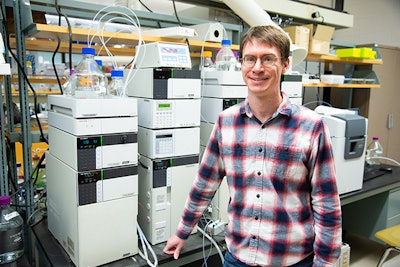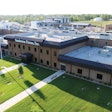
Researchers at Auburn University have received a four-year $499,577 grant from the National Institute of Food and Agriculture (NIFA) to investigate the possibility of using poultry processing wastewater to irrigate crops in controlled-environment agriculture.
“Our efforts are aimed at ways to reduce the amount of wastewater from processing plants that needs to be treated in the sewer system. This has the potential to reduce costs while also improving the environmental sustainability of the industry,” Brendan Higgins, assistant professor in the Department of Biosystems Engineering, explained.
A better use for wastewater
In 2018, poultry processing plants generated more than 62 billion gallons of wastewater at a cost of more than $247 million to treat.
If this water could be safely repurposed, it could lead to big savings on treatment costs and reduce the industry’s overall environmental impact.
“Poultry processing wastewater is loaded with nutrients – specifically nitrogen and phosphorus – which are basically plant fertilizer. The only problem is that they are in the wrong form for plants to use,” said Higgens.
The challenge
The project will address four challenges that stand in the way of the safe and efficient use of poultry wastewater in food production:
- Nutrients in the wastewater need to be in the appropriate form for stable crop production.
- Crops irrigated with wastewater must be free of pathogens.
- Any negative effects of antimicrobial chemicals in the poultry wastewater need to be mitigated.
“The biggest challenge is developing a process that ensures a safe food product and then (later) building consumer confidence in this product. I'm confident it is possible. Just look at other waste-to-food technologies like aquaponics which is already operating in the commercial space,” Higgins said.
The project will focus on developing a wastewater treatment reactor so the repurposed poultry wastewater can be used to grow lettuce. It will be located at the College of Agriculture’s Charles C. Miller Jr. Poultry Research and Education Center.
Other members of the research team include Daniel Wells, assistant professor in the Department of Horticulture; Dianna Bourassa, assistant professor and extension specialist in the Department of Poultry Science; and Rishi Prasad, assistant professor and extension specialist in the Department of Crop, Soil and Environmental Sciences.
Like what you just read? Sign up now for free to receive the Poultry Future Newsletter.


















